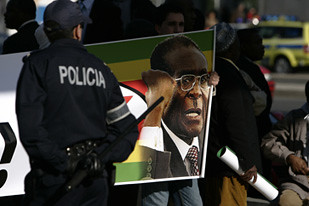
Poster supporting President Mugabe of Zimbabwe outside the EU-Africa Summit in Lisbon on December 9, 2007. Mugabe blasted the "gang of four" European leaders for being agents of British imperialism., a photo by Pan-African News Wire File Photos on Flickr.
Sanctions to go, says EU
Monday, 04 February 2013 00:0
Tendai Mugabe Senior Reporter
Zimbabwe Herald
The European Union says it will suspend illegal sanctions it imposed on Zimbabwe after the constitutional referendum expected next month.
The European bloc traditionally reviews its position on sanctions in February every year.
In response to questions yesterday, EU head of delegation to Zimbabwe Ambassador Aldo Dell’ Ariccia said the European bloc was keen to see the full implementation of the Global Political Agreement signed by Zanu-PF and the two MDC formations.
“The EU stated that a peaceful and credible constitutional referendum would justify a suspension of the majority of all restrictive measures,” he said.
“In this context, the recent agreement on the Constitution draft is a welcome step in that direction.”
Zimbabwe is set to hold a peaceful and credible referendum following the agreement by the three political parties in the inclusive Government to vote for the new charter.
Ambassador Dell’ Ariccia said the 27-member EU bloc was prepared to work with any Government born out of an election held under the Sadc guidelines and principles.
“Peaceful and credible elections, expected to be held in accordance with the Sadc guidelines and principles for the conduct of elections, should permit to achieve the ultimate goal of the GPA and allow the creation of a Government reflecting the freely expressed wishes of the people of Zimbabwe,” he said.
“The EU will recognise and work with any government formed as the result of such a process.”
Ambassador Dell Ariccia said the EU’s foreign policy was made by consensus among member state.
This could scupper efforts by some EU members that are keen to have a normal relationships with Zimbabwe as they may be arm-twisted by Britain which has a bilateral tiff with Harare.
“The EU only makes decisions on foreign policy by consensus, the council decisions are, therefore, a shared position of all the EU member states,” he said.
It is understood that most of the EU member states felt they are losing lucrative business opportunities in Zimbabwe, especially in the mining and agricultural sectors because of the illegal sanctions.
Last year, the EU reviewed its position on the sanctions twice, but resolved to maintain the embargo.
Ambassador Dell’ Ariccia said the EU delegation in Zimbabwe and its various missions were always in constant touch with Government officials exploring ways of normalising the relationship between the two sides.
“The EU Delegation and the other EU missions in Harare have maintained regular, open, sound and constructive contacts with the Government of National Unity and the Zimbabwe Ambassador in Brussels has had frequent meetings with her EU counterparts,” he said.
Although all parties in the inclusive Government admitted that sanctions were crippling Zimbabwe’s economy, Ambassador Dell’ Ariccia insisted that they were targeted.
The EU imposed illegal sanctions on Zimbabwe to influence the outcome of the 2002 presidential elections won by President Mugabe.
The illegal sanctions received condemnation from progressive forces across the world, including the African Union, Sadc and the Non-Aligned Movement. The sanctions were imposed illegally by the EU and the United States as they were imposed outside the United Nations processes.
In case of the EU, the sanctions were imposed in violation of the Cotonou Agreement that governs its relations with African, Caribbean and Pacific countries.
A senior Government official who requested anyonymity because of the negotiations between EU and Zimbabwe over the sanctions said it was not proper for the bloc to leverage the removal of sanctions on local political processes.
“The sanctions are illegal and the EU is fully aware of our position on the issue,” he said.
“They must simply remove them without dangling processes like the referendum and the elections. Everyone in the African, Carribean and Pacific bloc which holds joint meetings with the EU is advocating for the removal of the sanctions and the EU must respect that.” The official said setting preconditions for the removal of sanctions showed that the EU had a desired outcome of the referendum and the elections.
This, he said, was tantamount to influencing local politics.
“The fact that they are talking about political processes shows that they are baised and would not remove the sanctions if the outcome is different from what they desire,” said the official.
“The outcome of local political processes has nothing to do with the EU and the removal of the illegal sanctions. The conditions they are setting make us doubt their sincierity in removing the sanctions.”
Zanu-PF spokesperson Cde Rugare Gumbo said sanctions were illegal and there was no basis for the EU to set conditions such as the holding of the referendum for their removal.
“Our position has always been that there must be unconditional lifting of these sanctions,” he said.
No comments:
Post a Comment